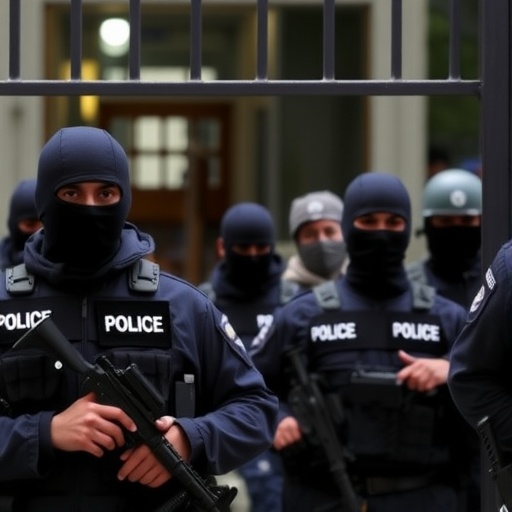In a bold move shaking the foundations of federal immigration enforcement, Congressional Democrats have unveiled a sweeping investigation into alleged misconduct by federal agents during immigration arrests. Reports of American citizens being wrongfully detained have ignited outrage, raising serious questions about the protection of legal rights amid aggressive raids.
Heartbreaking Stories Emerge from Wrongful Detentions
The investigation, spearheaded by a bipartisan but Democrat-led committee in the House Judiciary Subcommittee on Immigration and Citizenship, zeroes in on a series of harrowing incidents where U.S. citizens found themselves handcuffed and separated from their families in what were supposed to be targeted immigration arrests. One particularly alarming case involves Maria Gonzalez, a 42-year-old born-and-raised Californian whose parents immigrated from Mexico decades ago. Last month, federal agents from Immigration and Customs Enforcement (ICE) stormed her Los Angeles home at dawn, mistaking her for an undocumented individual based on a tip that later proved false.
“I was terrified,” Gonzalez recounted in an emotional interview with local media. “They didn’t listen when I showed them my birth certificate. My kids were screaming, and I thought I’d never see them again.” Her ordeal lasted 48 hours in a detention center before her citizenship was verified, but the psychological trauma lingers. Stories like hers are not isolated; according to preliminary data gathered by advocacy groups like the American Civil Liberties Union (ACLU), at least 27 U.S. citizens were erroneously detained in immigration arrests across Texas, California, and Arizona between January and September of this year alone.
Congressional Democrats, including Rep. Veronica Escobar (D-TX), who chairs the subcommittee, have cited these cases as emblematic of broader systemic failures. “Federal agents are crossing lines that erode the very legal rights our Constitution guarantees,” Escobar stated in a press conference on Capitol Hill. The probe aims to dissect how such errors occur, from flawed intelligence sharing between agencies to inadequate training on verifying citizenship status during high-stakes operations.
Statistics paint a grim picture: A 2022 Government Accountability Office (GAO) report revealed that ICE detentions of U.S. citizens spiked by 23% from 2019 to 2021, often due to racial profiling and overreliance on outdated databases. In border states, where immigration arrests are most frequent, Latino and Asian American communities report feeling under siege, with community leaders noting a 15% drop in school attendance and healthcare visits attributed to fear of federal sweeps.
Federal Agents Face Scrutiny Over Training and Tactics
At the heart of the Congressional Democrats‘ investigation lies a deep dive into the operations of federal agents, particularly those from ICE and U.S. Customs and Border Protection (CBP). Critics argue that aggressive tactics employed in immigration arrests—such as no-knock warrants and rapid deployments—prioritize speed over accuracy, leading to violations of legal rights. The committee plans to subpoena internal ICE memos and training manuals to uncover whether agents are adequately equipped to distinguish between citizens and non-citizens in the heat of the moment.
One focal point is the use of databases like the Enforcement Integrated Database (EID), which aggregates immigration records but has been plagued by errors. A whistleblower from within CBP, speaking anonymously to The Washington Post, alleged that agents receive only cursory training—about four hours annually—on citizenship verification protocols. “We’re told to act fast because quotas matter more than rights,” the source claimed, echoing concerns raised in a 2023 internal audit that found 12% of arrests involved incomplete identity checks.
Congressional Democrats are not holding back. Sen. Dick Durbin (D-IL), a key figure in the Senate’s involvement, has called for an immediate halt to certain raid practices until reforms are implemented. “This investigation will hold federal agents accountable and ensure that immigration enforcement doesn’t become a tool for terrorizing American families,” Durbin declared during a Senate floor speech. The probe extends to inter-agency coordination, examining how the Department of Homeland Security (DHS) oversees these operations and whether political pressures from the administration influence enforcement priorities.
To bolster their case, Democrats have enlisted experts from the Migration Policy Institute, who provided testimony highlighting that similar issues plagued the Trump-era family separation policy, where over 5,000 children were separated from parents, including U.S. citizen kids in some verified instances. The current investigation seeks to prevent a repeat, with proposed legislation already in draft form that would mandate body cameras for all immigration arrests and independent audits of detention facilities.
Legal Rights Under Siege: Experts Sound the Alarm
As the investigation unfolds, legal experts are rallying behind Congressional Democrats, emphasizing the profound implications for legal rights in immigration arrests. The Fourth Amendment’s protections against unreasonable searches and seizures are at the forefront, with attorneys arguing that federal agents’ actions often blur the line between enforcement and overreach. “Detaining a citizen without probable cause isn’t just a mistake—it’s a constitutional crisis,” said Rachel Cohen, a civil rights lawyer with the Southern Poverty Law Center.
In a detailed brief submitted to the subcommittee, the ACLU outlined 15 documented cases since 2020 where U.S. citizens sued federal agents for wrongful arrest, resulting in over $2.5 million in settlements. One landmark suit, filed in federal court in New York, involved a veteran who was detained for 72 hours after returning from deployment abroad; the court ruled that agents violated his due process rights by ignoring military ID verification.
Congressional Democrats are leveraging these legal precedents to push for systemic change. The investigation includes hearings scheduled for next month, where survivors of wrongful detentions will testify alongside former federal agents. Rep. Pramila Jayapal (D-WA) highlighted the human cost: “These aren’t statistics; they’re lives upended. Our legal rights are meaningless if they’re selectively enforced based on appearance or accent.”
Broader context reveals a pattern: A 2023 Pew Research Center study found that 45% of Hispanic Americans fear immigration enforcement will affect them personally, even if documented. This climate of dread has spurred community organizing, with groups like United We Dream collecting affidavits from over 500 affected individuals to support the probe. Legal scholars also point to international comparisons, noting that countries like Canada have stricter protocols for citizenship checks during border operations, resulting in fewer errors.
The investigation’s scope isn’t limited to individual rights; it probes potential discriminatory practices. Data from the Transactional Records Access Clearinghouse (TRAC) at Syracuse University shows that 78% of those targeted in recent immigration arrests in urban areas are people of color, prompting accusations of racial bias that Democrats vow to address head-on.
Tracing the Roots: A History of Immigration Enforcement Missteps
To fully grasp the urgency of this Congressional Democrats-led investigation, one must look back at the troubled history of federal agents’ involvement in immigration arrests. The roots trace to the post-9/11 expansion of DHS, when ICE was formed in 2003 amid heightened national security concerns. What began as a targeted agency morphed into a behemoth with broad powers, leading to documented abuses like the 2008 workplace raids in Iowa that netted over 400 arrests, including dozens of legal residents and citizens.
Fast-forward to the Obama administration, where deportation numbers peaked at 400,000 annually, and errors in immigration arrests drew bipartisan criticism. The Trump years amplified the issue, with policies like “zero tolerance” resulting in family separations that a federal judge later deemed violations of legal rights. Even under Biden, interior enforcement has continued, with ICE reporting 142,000 removals in fiscal year 2023—many from non-border areas—raising flags about overreach.
Congressional Democrats reference these episodes to argue for reform. In a recent op-ed in The New York Times, Rep. Escobar wrote, “History shows us that unchecked power in immigration arrests leads to tragedy. This investigation is our chance to rewrite that narrative.” Archival records subpoenaed by the committee include redacted reports from the 2019 Mississippi raids, where 680 people were arrested in a single day, and subsequent reviews found procedural lapses affecting citizens.
Stakeholders beyond Congress are weighing in. The U.S. Conference of Mayors has passed a resolution supporting the probe, citing economic fallout from community fear—estimated at $1.2 billion in lost productivity in affected cities. Immigrant rights organizations like the National Immigration Law Center provide data showing a 30% increase in wrongful detention lawsuits since 2021, underscoring the need for accountability.
This historical lens also informs policy recommendations emerging from the investigation, such as enhanced community outreach programs to build trust and mandatory cultural sensitivity training for federal agents. By connecting past failures to present-day actions, Democrats aim to craft enduring safeguards against future violations.
Path Forward: Reforms and the Road to Accountability
Looking ahead, the Congressional Democrats’ investigation into immigration arrests promises to catalyze significant reforms in how federal agents operate. With hearings set to begin in early December, the subcommittee anticipates issuing a comprehensive report by spring 2024, complete with legislative proposals to strengthen legal rights protections. Among the anticipated measures: A federal registry for real-time citizenship verifications during arrests and penalties for agents who fail to follow protocols, potentially including fines up to $10,000 per violation.
Rep. Jayapal outlined next steps in a virtual town hall: “We’ll work across the aisle if possible, but we won’t compromise on justice. This probe could redefine immigration enforcement for generations.” Bipartisan support is tentative; while some Republicans like Sen. Lindsey Graham (R-SC) have expressed interest in efficiency improvements, others decry the investigation as politically motivated amid election cycles.
Advocacy groups are mobilizing, with planned rallies in Washington, D.C., to amplify calls for change. The DHS has responded cautiously, with Secretary Alejandro Mayorkas stating, “We welcome oversight to ensure our actions align with the law.” Yet, internal leaks suggest resistance, as budget cuts to training programs have left agents underprepared.
Ultimately, the implications extend beyond borders: A successful investigation could restore faith in federal institutions, reduce litigation costs (projected at $500 million annually for wrongful detentions), and foster a more humane approach to immigration. As families like the Gonzalezes await justice, the nation watches to see if accountability will prevail over expediency in safeguarding legal rights.








